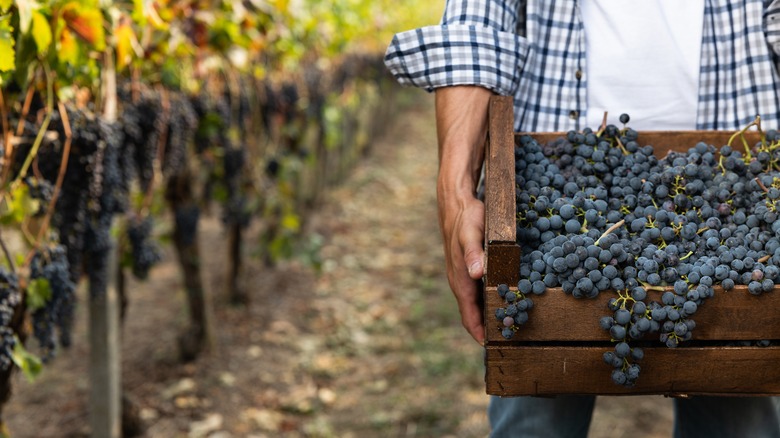Why Organic Wine Might Not Be Chemical-Free
If you pick up a bottle of organic wine at your favorite wine and spirits store, you might naturally assume the wine is free from all chemicals and that no pesticides or other suspect compounds were used in the growing of that wine's grapes. However, that's not always the case. There are exceptions, and it all comes down to how you define "organic."
According to the United States Environmental Protection Agency, the term "organically grown" can be used to describe any food item that's grown and processed without synthetic fertilizers or pesticides. However, the EPA is quick to point out that "organically grown" foods can be grown and/or processed using pesticides and chemicals derived from natural sources. Because of this, some winegrowers will say that their grapes were grown using no chemicals when, in actuality, they just mean their grapes are grown without the use of most synthetic chemicals (via Vinepair). According to an organic grape production guide from Cornell University, the naturally-derived chemicals used in natural pesticides may range from sulfur to mineral oil, petroleum oil to potassium silicate.
What wine is truly chemical-free?
If you want to find some truly chemical-free wine, you'll have to do a little label reading and research. As the Organic Vineyard Alliance points out, there are quite a few terms used to describe various types of wine and how wine grapes are grown, including sustainable, natural, organic, biodynamic, and USDA-certified organic. If you're looking for the rawest, most chemical-free wine possible, your best bet may be a natural wine. As Vox explains, natural wine is made from grapes grown without pesticides or herbicides. The grapes are hand-picked versus machine-picked. Native yeast is used to ferment the wine, and the wine contains no additives (except for the occasional sulfites, depending on the producer). Natural wine is unfiltered and, according to winemaker Krista Scruggs, who was interviewed for the Vox article, "chemical-free, and that's awesome."
However, it's worth noting that you'll still need to do a little research to find truly "natural" wine, even if a wine touts itself as natural. The Organic Vineyard Alliance points out that natural wines are not third-party certified, so there's a bit of wiggle room for growers and producers.

